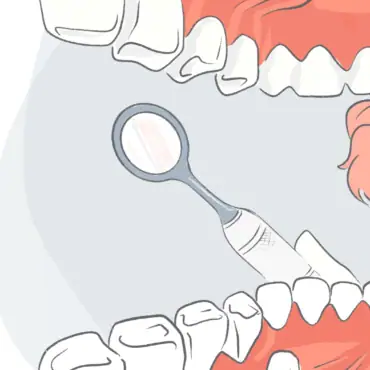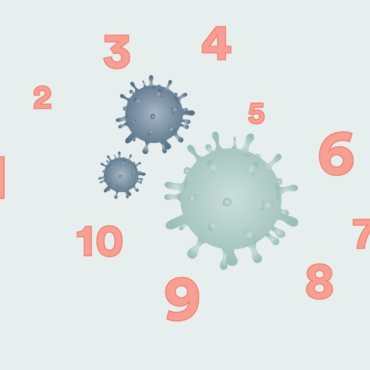JUMP TO: What are tonsil stones / Causes and Symptoms / Bad breath / Home remedies / Professional remedies / Prevention / Book a dentist online to diagnose
Small but mighty, our tonsils are an important part of our body’s immune system and can develop tonsil stones if you’re not careful.
We have three different types of tonsils—the palatine tonsils, the adenoids, and the lingual tonsils. However, our palatine tonsils are the only ones that can easily be seen through an open mouth. These soft, oval-shaped tissue masses are located in the back of your throat.
Tonsils are made of tissue similar to our lymph nodes and are coated with pink mucosa. They contain white blood cells that defend against bacteria and viruses that enter through your nose and mouth. Tonsils also help keep foreign objects from reaching our lungs.
What are tonsil stones?
Tonsils have tonsillar crypts which are like pits, crevices, or tunnels. Tonsil stones, also called tonsilloliths, are white or yellow formations made up of bacteria and live biofilm that get stuck in these tonsillar crypts and harden.
And they can be dangerous when not dealt with properly. Here’s everything you need to know about how to keep your tonsils healthy and what to do if you are affected by tonsil stones.
Causes and symptoms of tonsil stones
What causes tonsil stones? Tonsil stones may be caused by poor dental hygiene, large tonsils, chronic tonsillitis (inflamed tonsils), or chronic sinus issues. Debris in your tonsil crypts, whether it be particles of food from insufficient teeth cleaning or mucus from postnasal drip, can also cause tonsil stones. Some sources say around 8 percent of the population has tonsil stones, while other studies claim as many as 30 percent of people have them.
Tonsil stones causes can root from genetic factors. You’re at an increased risk to develop tonsil stones if you’re between the ages of 20 to 40. Women are around 33 percent more likely to get tonsil stones than men. People are more prone to tonsil stones if they have dry mouth, postnasal drip, overactive salivary glands, infections, or recurrent tonsillitis. In fact, a study published in the British Dental Journal discovered that 75 patients in the study who had tonsillitis also had tonsil stones. Only 6 percent didn’t develop tonsil stones as a result of this inflammation.
Still need answers? Get $50 when you see a dentist.
Your dentist can help prevent and treat your white patches. Earn $50 for booking!
Frequently, people with tonsil stones don’t even realize they have them. That’s because the size and location of tonsils stones affect the symptoms they cause. They can range from the size of a grain of rice to a grape—with the smaller ones less likely to cause any symptoms. Small tonsil stones may even be swallowed or coughed up without the person noticing. However, if you cough up tonsil stones, you’ll likely notice the smell right away. The larger ones are easier to detect as they can cause your tonsils to become inflamed and tend to smell noticeably unpleasant.
Why do tonsil stones make your breath small bad?
Sometimes, tonsil stones smell. Tonsil stones have a foul odor because they have a high amount of sulfur. According to a study conducted at the National Center for Biotechnology Information, 75 percent of people with uncommonly high quantities of sulfur in their mouths have tonsil stones. Tonsil stones raise your chances of bad breath by up to 10 times. Tonsil stones smell bad and can make your breath also suffer.
In addition to chronic bad breath, common symptoms of tonsil stones include white or yellow spots on tonsils, a sore or restricted throat, swollen tonsils, a feeling that something is stuck in your throat, ear pain, and/or difficulty swallowing. One might also experience coughing or a metallic taste in the mouth.
Tonsil stone pain can even spread to your ear and create a chronic earache. This is because your tonsils are connected to your ears by the glossopharyngeal nerve, which is commonly referred to as Jacobson’s nerve.
Symptoms that require medical attention include (but aren’t necessarily limited to): pus from the tonsil area, severely enlarged or very red tonsils, bleeding tonsils, breathing issues, pain (especially if uneven on each side), swallowing problems, and a sore throat of over a month.
Serious tonsil stone complications are rare, but do occur. It’s possible for your tonsils to become deeply infected or for large tonsil stones to damage tonsil tissue, so err on the side of caution when dealing with large tonsil stones.
How to get rid of tonsil stones
Tonsil stone removal can be tricky. Often, tonsil stones will dislodge on their own. If they don’t naturally dislocate and are painful or have a foul odor, it’s possible to remove them at home.
Gargles
Many people try to manually remove their stones with a toothbrush, but this isn’t recommended as your tonsils are delicate. Using rough items could cause bleeding or an infection. Tonsil stone removal should be very carefully tried at home, but seek professional help if you find at home remedies are not working.
Gargling with salt water, a nonalcoholic mouthwash, or diluted apple cider vinegar can help with any smell and possibly dislodge the stones. Some people choose oxygenating mouthwashes containing chlorine dioxide and natural zinc compounds. These are strong and should be used sparingly—not more than once or twice a week. Coughing, whether natural or forced, also tends to loosen up and helps remove tonsil stones.
Water flossing or Waterpik
A low-pressure water irrigator, such as a water flosser, is another useful tool for dislodging tonsil stones, as well as prevent new ones from developing.
To remove your stones with a water flosser, carefully aim the flosser towards the tonsil stones. Put it at the lowest setting and test to make sure it isn’t too painful. Do this in a well-lit area and be aware they may fall to the back of your throat. It isn’t dangerous to swallow tonsil stones, but it can be unpleasant to do so. Don’t use this method on children as they could choke.
See a dentist
If your tonsil stones are large or persistent, you may need help from a doctor or dentist to remove them. An official tonsil stones diagnosis can be challenging because the stones can hide in the folds of your tonsils. However, tonsil stones can show up in dental X-rays or a CT scan.
The first course of action is sometimes antibiotics because they decrease the amount of bacteria tonsil stones need to grow. However, antibiotics are more for tonsil stone management than a long-lasting cure and have side effects. You may need to see a dentist or doctor to prescribe pain medication if it gets unbearable.
Still need answers? Get $50 when you see a dentist.
Your dentist can help prevent and treat your white patches. Earn $50 for booking!
Laser tonsil cryptolysis
Another option is laser tonsil cryptolysis. In this procedure, you’re often given local anesthesia before a laser is used to remove the crypts where the tonsil stones are lodged. This procedure is low in pain and recovery time is usually speedy. There is a slight risk of an airway fire (a surgical fire that occurs in an airway) or receiving oral or facial burns.
Coblation Cryptolysis
If lasers make you nervous, you can have tonsil stones removed with coblation cryptolysis (radio frequencies) that involves no heat. This method also removes tonsil crypts, but by changing a salt solution into charged ions that cut through the tonsil tissue. One session can significantly decrease stones or eliminate the current ones completely. Recovery takes only a few days.
Tonsillectomy
As a final resort, a medical professional may recommend a tonsillectomy. These are less common than they were in the past. Today, only severe or chronic cases require this procedure. And while it’s more common for children to have tonsillectomies, it’s also possible for adults.
To qualify for a tonsillectomy, you need to have seven cases of tonsillitis or strep throat within one year. During a tonsillectomy, your tonsils are surgically removed with a scalpel, coblation device, or laser. In addition to helping with tonsil stones, tonsillectomies can help with tonsillitis (infection of the tonsils), quinsy (recurring abscesses near tonsils), and some instances of obstructive sleep apnea.
Depending on your situation, you might also get your adenoids removed. Signs of enlarged adenoids include breathing through the mouth, a nasal-sounding voice, noisy breathing, and snoring. This procedure is called an adenotonsillectomy. Patients typically have trouble swallowing and a sore throat for a few days following the procedure and may continue to have some pain for a week or two. Bleeding is another possible side effect.
How long do tonsil stones last?
Tonsil stones usually dislodge on their own over a few weeks. Sometimes, a person can cough and dislodge the tonsil stone. However, if the problem persists, we recommend you see a dentist to discuss possible treatments.
How to prevent tonsil stones
A tonsillectomy is the only way to completely prevent tonsil stones, but as previously mentioned, this is only done after other methods have failed to eliminate your stones.
Maintaining good oral hygiene is one of the best methods anyone can use to prevent tonsil stones. In addition to brushing your teeth twice daily, make sure to brush your tongue to remove bacteria. Alternatively, consider using a tongue scraper. Limit smoking, dairy products, and alcohol.
It is important to see a dentist frequently in order to maintain good oral hygiene.
Smoking and alcohol can dry out your mouth and this can raise the chances of tonsil stones building up. Increase your water intake to stay hydrated and wash away food particles in your throat. Either gargle with salt water or use a water flosser to rinse bacteria off of your tonsils every week. If you have postnasal drip often, clean out your nasal passages.
Need Help?
Without surgery, you can’t completely prevent tonsil stones. But the good news is that, in many cases, tonsil stones show no symptoms and can be naturally eliminated without you realizing you had them at all.
However, as we’ve explored here today, it’s also possible for tonsil stones to be large and painful.
To help prevent these stones, try various mouth rinses and have high standards for your oral hygiene. If you still develop painful tonsil stones, you can try to remove them naturally with a water flosser or gargling. Alternatively, a professional can prescribe antibiotics, perform laser tonsil cryptolysis, use coblation cryptolysis, or conduct a tonsillectomy.
If you aren’t sure whether you’re suffering from tonsil stones or what to do about the ones you have, it’s time to check in with a dental professional. Find personalized dental care that’s approachable, convenient, and focused on you by signing up for Opencare right now.
Still need answers? Get $50 when you see a dentist.
Your dentist can help prevent and treat your white patches. Earn $50 for booking!









